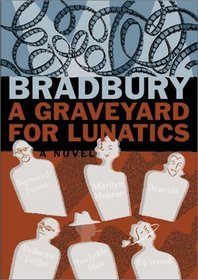Helpful Score: 3
Bradbury's thin plot staggers and creaks from the unlikely to the obvious, characters wander in and out almost as afterthoughts ⦠AND NONE OF IT MATTERS! The delight in this book is Bradbury's dance with the language he loves. Words dance, swoop, march, snap, shout, caress, and tumble off the page in a solid, living mass that twine around the reader like morning glories around a farmhouse porch.
I've recently (re)discovered Ray Bradbury novels, having read them in high school and during my undergrad program, but I find that they are far more rich and meaningful, now that I have some additional life experience. I find that I can just relate to the material in a more profound way. Bradbury is a true wordsmith, not in the pejorative sense: he always weaves such a rich tapestry of prose that readers can easily project themselves into the scenes. The characters are well-developed, not so much through a narrative portrait of them, but more in the dialogue and the extrapolation of their motives and actions, which creates far more depth than simplistic, superficial descriptions.
That said: this wasn't one of my favorites, although I still liked it. I think there's much more than meets the eye, here, and that a substantial amount of this book is intended to be allegorical, but darned if I can figure out what that is, at least with the first read-through. The story really lags about halfway through, and rather than building throughout to a conclusion, it seems to labor through the material in a way that most of his other novels don't. The strengths lie in the characteristic poetic prose, which is rich without ever being pretentious, and is always enjoyable to read.
That said: this wasn't one of my favorites, although I still liked it. I think there's much more than meets the eye, here, and that a substantial amount of this book is intended to be allegorical, but darned if I can figure out what that is, at least with the first read-through. The story really lags about halfway through, and rather than building throughout to a conclusion, it seems to labor through the material in a way that most of his other novels don't. The strengths lie in the characteristic poetic prose, which is rich without ever being pretentious, and is always enjoyable to read.




